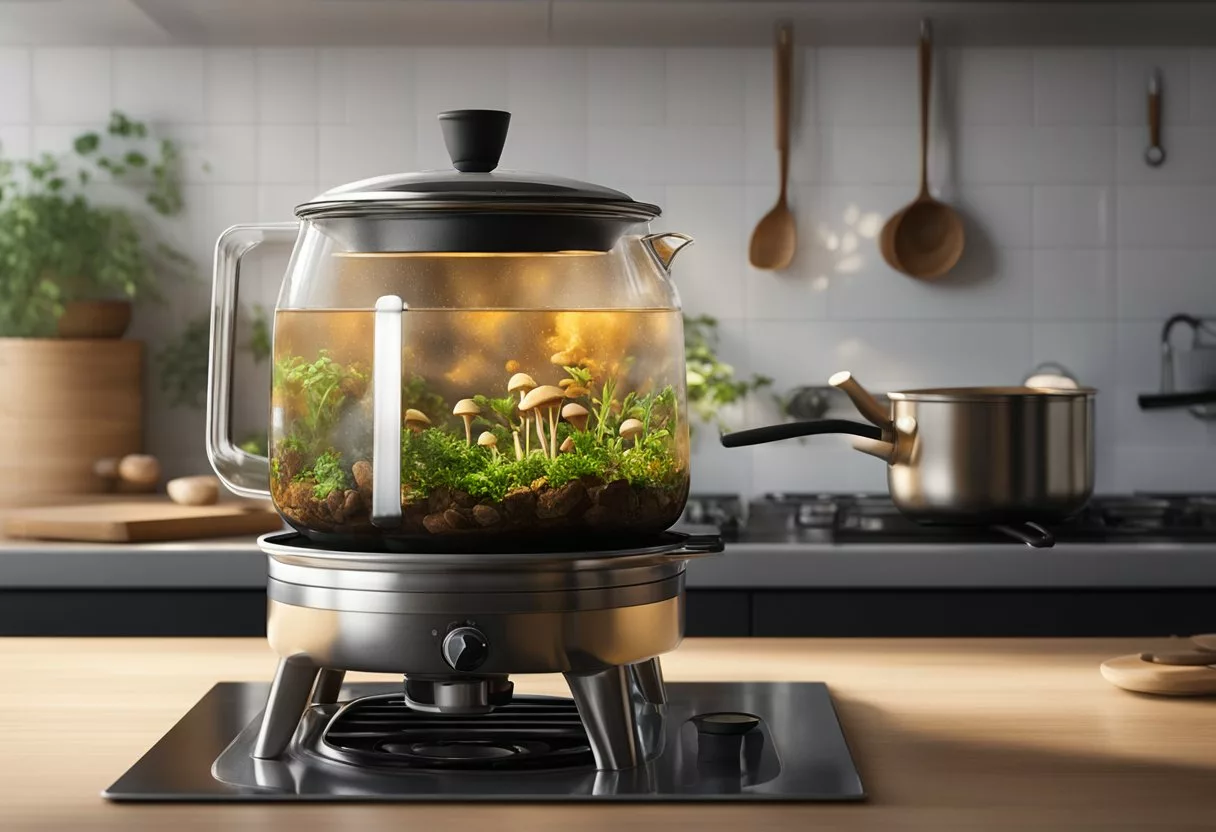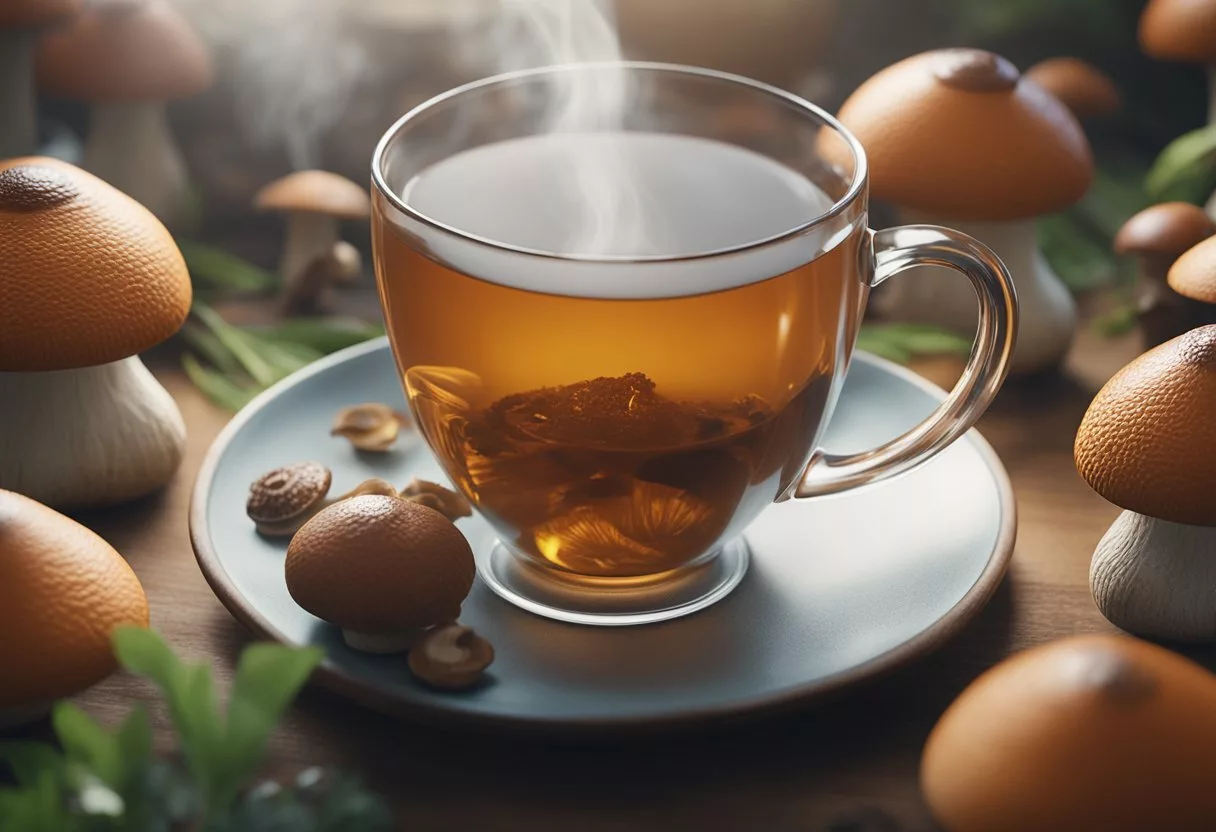Reishi mushroom tea, made from the Ganoderma lucidum mushroom, offers a range of health benefits that have been cherished in Eastern medicine for centuries. This remarkable tea is known to boost the immune system, reduce inflammation, and improve sleep quality. Reishi mushroom tea’s unique properties can support overall health and well-being.

Consumption of Reishi mushroom tea is simple and can be easily incorporated into daily routines. To prepare the tea, you typically simmer dried Reishi mushrooms in water for an extended period to extract their beneficial compounds. The resulting brew is both earthy and slightly bitter, making it a unique addition to one’s dietary regimen.
Although Reishi mushroom tea is generally safe, it’s important to consult a healthcare provider before adding it to your diet, especially if you are on medications or have existing health conditions. Some of the side effects may include digestive discomfort or interactions with certain drugs.
Key Takeaways
- Reishi mushroom tea boosts the immune system and improves sleep.
- Preparation involves simmering dried Reishi mushrooms in water.
- Consult a healthcare provider before consuming Reishi mushroom tea.
Understanding Reishi Mushrooms

Reishi mushrooms, or Lingzhi, have been revered for centuries for their potential health benefits. They are a type of functional mushroom known for their unique properties.
Historical Context and Traditional Uses
Reishi mushrooms, particularly in Asia, have a long history of use. In Traditional Chinese Medicine (TCM), they are called Lingzhi, meaning “the mushroom of immortality.” They were often used to promote health and longevity.
For thousands of years, these mushrooms were primarily reserved for royalty and the wealthy due to their scarcity and value. Ancient texts detail their use in treating various ailments, including boosting the immune system and enhancing vitality.
Botanical Characteristics
Reishi mushrooms are easily recognizable by their distinct appearance. They have a glossy, reddish-brown surface with a kidney-shaped cap. The caps can grow quite large, sometimes reaching several inches in diameter.
They usually grow on the decaying wood of hardwood trees, especially in tropical and subtropical regions. The spores of the Reishi mushroom are released from pores on the underside of the cap.
Classification and Species
Reishi mushrooms belong to the Ganoderma genus. The species most commonly used for health benefits include Ganoderma lucidum and Ganoderma sinense. These species have slightly different properties and appearances but share many characteristics.
There are many other species within the Ganoderma genus, but not all of them are used for medicinal purposes. The classification of these mushrooms is based on their genetic makeup and physical characteristics. These mushrooms are widely studied for their bioactive compounds, including triterpenes and polysaccharides, which are believed to contribute to their health-promoting effects.
Health Benefits of Reishi Mushrooms

Reishi mushrooms offer a range of health benefits, including boosting the immune system, supporting heart health, regulating blood sugar, and aiding relaxation.
Immune System Support
Reishi mushrooms are known to boost the immune system. They contain compounds like triterpenes and beta-glucans which help the body fight infections and illnesses. These compounds enhance the activity of white blood cells, crucial for immune defense. Regular consumption can make the immune system more robust, providing better protection against pathogens and possibly reducing the frequency of colds.
Cancer and Reishi
Studies have shown that reishi mushrooms may have anti-cancer properties. Their polysaccharides and triterpenes could inhibit cancer cell growth and promote apoptosis, or cell death, in cancerous cells. While more research is needed, this potential makes them a point of interest in cancer prevention strategies. It’s essential to note that reishi should be considered a complementary treatment rather than a primary therapy.
Anti-Inflammatory Effects
Reishi mushrooms possess significant anti-inflammatory effects. The triterpenoids in reishi can help reduce inflammation by inhibiting certain molecules that trigger inflammatory responses. This can be beneficial for conditions like arthritis or other inflammatory diseases. It can also aid in managing chronic inflammation, which is linked to a variety of health issues, including heart disease.
Cardiovascular Health
Reishi mushrooms contribute to better cardiovascular health. They can improve blood circulation and lower blood pressure. The antioxidants in reishi protect the heart by reducing oxidative stress and inflammation. This reduces the risk of artery damage and heart disease. Regular intake may support overall heart function and maintain healthy cholesterol levels.
Blood Sugar Regulation
Reishi mushrooms can help in regulating blood sugar levels. They contain compounds that enhance insulin sensitivity, allowing the body to manage glucose more effectively. This quality makes them beneficial for people with diabetes or those at risk of developing it. Consistent use of reishi can lead to better blood sugar control and possibly prevent related complications.
Liver Function
Reishi mushrooms are beneficial for liver function. They have hepatoprotective effects, which means they can help protect the liver from damage. The antioxidants and immune-boosting properties assist in detoxifying the liver and improving its efficiency. This can be helpful for those with liver problems, such as hepatitis.
Sleep and Relaxation
Reishi mushrooms can promote better sleep and relaxation. They have calming effects that may help with insomnia and anxiety. The compounds in reishi help regulate the body’s sleep cycle and reduce stress levels. Drinking reishi mushroom tea before bed can result in deeper, more restful sleep and improve overall sleep quality.
Preparing Reishi Mushroom Tea

Preparing Reishi mushroom tea involves selecting quality ingredients, using both traditional and modern preparation methods, and enhancing the flavor to suit your preferences. This guide will help you navigate each step to brew the perfect cup of Reishi mushroom tea.
Choosing Quality Reishi
Selecting high-quality Reishi mushrooms is crucial. Look for certified organic Reishi mushrooms to ensure they are free from pesticides and additives. Dried Reishi mushroom slices are commonly used and should appear clean and consistent in color.
If you prefer powders, opt for those labeled as “pure extract” to ensure you’re getting the most potent form. Always buy from reputable suppliers to avoid contaminated or inferior products.
Traditional Preparation Methods
The traditional way to make Reishi mushroom tea uses dried slices. Start by adding 1-2 teaspoons of dried Reishi mushroom slices to a pot with 4 cups of water. Bring the water to a boil, then reduce the heat and let it simmer for 30 to 60 minutes.
For a stronger tea, simmer longer. After simmering, use a strainer to separate the liquid from the mushroom slices before serving. The resulting tea will have an earthy, bitter taste that some may find strong.
Modern Brewing Techniques
Modern techniques often incorporate Reishi mushroom powder for convenience. With powdered extract, simply add one-quarter to one-half teaspoon of powder to hot water and stir.
Since the Reishi is already extracted, this method skips the simmering process, making it quicker and easier. This technique is great for those who want the benefits without the long brewing time.
Flavor Enhancements and Pairings
Reishi mushroom tea has a naturally bitter taste, which can be enhanced with various flavorings. Adding honey or maple syrup can help sweeten the tea. Spices like cinnamon or ginger can also be added during the simmering process for extra flavor.
Pairing the tea with mild snacks such as crackers or fruit can balance the bitterness and improve the experience. These additions can make it more enjoyable while still allowing you to benefit from its properties.
Consumption Guidelines
When consuming reishi mushroom tea, it’s essential to focus on the optimal dosage, timing, potential interactions with medications, and who should avoid it. These guidelines can help maximize the benefits and ensure safety.
Optimal Dosages for Health
The appropriate dose of reishi mushroom tea depends on the individual and the purpose of consumption. For general health benefits, a common recommendation is to start with 1 to 2 grams of dried reishi mushroom per day.
Increasing to about 5 grams might be suitable for those seeking specific health improvements. Always follow product instructions and consult a healthcare provider.
For those preferring tea bags, one tea bag per cup is standard. Adjust the dosage gradually to find what works best for your body without causing side effects.
Timing and Frequency of Intake
Timing can influence the effectiveness of reishi mushroom tea. Some prefer taking it in the morning to boost energy and focus. Others find that drinking it in the evening or at bedtime helps improve sleep quality and reduce fatigue.
Daily consumption is considered safe for most people, provided the dosage is appropriate. Start with lower doses and observe your body’s reaction before increasing the frequency.
For chronic illnesses or specific health concerns, consult with a healthcare professional to tailor the timing to your needs.
Potential Interactions with Medications
Reishi mushroom tea can interact with certain medications. Those taking blood thinners should be cautious, as reishi might increase the risk of bleeding. Similarly, it may affect blood pressure medications, so monitoring and adjusting dosage with a doctor’s guidance is crucial.
Individuals on immunosuppressants should also consult their healthcare providers, as reishi is known for its immune-boosting properties, which could counteract these medications.
Always check with a healthcare professional if you are on medication or managing a health condition to avoid adverse interactions.
Who Should Avoid Reishi
Reishi mushroom tea is not suitable for everyone. Pregnant or breastfeeding women should avoid it unless advised otherwise by a health professional.
People with bleeding disorders should refrain from consuming reishi due to its blood-thinning potential. Additionally, those with a known allergy to mushrooms should not consume reishi products.
Children and those with chronic illnesses should approach reishi with caution, under the guidance of a healthcare provider. Always err on the side of caution and consult a professional if unsure.
Potential Side Effects

Reishi mushroom tea can offer health benefits but may also cause unwanted reactions. It’s important to know both the common and serious side effects before consuming it.
Common Adverse Reactions
Some people may experience mild side effects when taking reishi mushroom tea. These include:
- Upset stomach: Drinking reishi tea can sometimes lead to nausea or stomach pain.
- Skin issues: Rashes and skin itching are possible, particularly for those with sensitive skin.
- Dizziness: Feeling lightheaded or dizzy is a reported side effect.
- Dry mouth: A common minor complaint is a feeling of dryness in the mouth.
These reactions can vary among individuals. It is advisable to start with a small dose and monitor your body’s response. Consulting a doctor before beginning any new supplement is always recommended to ensure it won’t interfere with other medications.
Rare but Serious Concerns
While rare, there are more serious side effects:
- Liver toxicity: In some uncommon instances, high doses can negatively impact liver health.
- Bleeding issues: Reishi mushroom has anticoagulant effects, which means it can thin the blood. This can be particularly risky for those with bleeding disorders or those preparing for surgery.
- Allergic reactions: Though infrequently, some individuals may develop severe allergies. Symptoms can include difficulty breathing, swelling, and severe skin reactions.
- Breastfeeding considerations: Pregnant or breastfeeding women should exercise caution as the effects on infants are not well studied.
These serious concerns emphasize the importance of talking to a healthcare provider before incorporating reishi mushroom tea into your health regimen. Make sure any potential risks are carefully weighed against the benefits.
The Science Behind Reishi Mushrooms

Reishi mushrooms are packed with beneficial compounds that have a positive effect on the body, ranging from boosting the immune system to acting as adaptogens.
Active Ingredients and Their Effects
Reishi mushrooms contain several active ingredients, including beta-glucans, triterpenes, polysaccharides, and antioxidants.
- Beta-glucans are known to enhance immune function by stimulating white blood cells and lymphocytes.
- Triterpenes have anti-inflammatory and anticancer properties.
- Polysaccharides help in regulating immune responses and possess potent antioxidant properties, protecting cells from damage.
These components work together to provide significant health benefits, making Reishi a powerful mushroom in nutrition and medicine.
Research on Immune System Impact
Studies show that Reishi mushrooms can boost the immune system by enhancing the activity of immune cells, such as natural killer cells and macrophages.
These cells play a crucial role in defending the body against pathogens. Reishi mushrooms can increase the production and activity of these cells, making them more effective at attacking and destroying harmful organisms. Additionally, the mushroom’s compounds help regulate inflammation, reducing the chances of chronic illnesses.
Understanding Adaptogens
Reishi mushrooms are considered adaptogens, which help the body adapt to stress and restore balance.
Adaptogens like Reishi support the adrenal glands and improve the body’s response to stress. This can lead to better mental clarity, reduced fatigue, and enhanced overall well-being. The beneficial compounds in Reishi, including beta-glucans and triterpenes, contribute to these adaptogenic properties, making it a valuable tool for maintaining health and resilience.
By incorporating Reishi, individuals can better cope with physical and emotional stressors, promoting a balanced and healthy life.
Incorporating Reishi into Your Diet

Adding reishi mushrooms to your diet can improve your immune function, skin health, and overall well-being. Below, you’ll learn about the best ways to include reishi mushrooms in meals and drinks and how to maintain a balanced diet.
Tea vs. Other Forms of Reishi
Reishi mushroom tea is one of the most popular ways to consume reishi. This herbal tea is easy to make and can be enjoyed hot or cold. Other common forms include reishi supplements and tinctures.
Supplements often come in capsules or powder form. Reishi tinctures are liquid extracts that can be added to drinks or taken directly. While tea offers the benefit of hydration and relaxation, tinctures and supplements provide concentrated doses, which might be more convenient for those looking for a quick intake.
Cooking with Reishi Mushrooms
Cooking with reishi mushrooms is another delicious way to get their benefits. These mushrooms can be quite tough and bitter, so they are usually softened by boiling. For instance, boiling sliced reishi mushrooms for at least two hours helps release their active compounds.
The strained liquid from the boiled mushrooms can be used to flavor soups, stews, and broths. This method adds a nutritious boost to your meals. Reishi can also be incorporated into recipes like reishi mushroom tea lattes by mixing the broth with frothed milk for a comforting drink.
Creating a Balanced Reishi Diet
When integrating reishi into your diet, it’s important to balance it with other nutritious foods. A balanced diet should include a variety of proteins, fruits, vegetables, and whole grains to ensure overall health.
Including reishi as part of a diverse diet helps to support gut health and the immune system. For example, combining reishi tea with other healthful beverages or using reishi extracts in smoothies ensures a well-rounded intake.
Consulting a healthcare provider before making significant changes ensures that it fits with your individual health needs.
Sustainable and Ethical Sourcing

Sustainability and ethical sourcing ensure that Reishi mushroom tea is both good for consumers and the environment. It also preserves the potency and health benefits of these functional mushrooms.
Identifying Ethically Sourced Reishi
Ethical sourcing of Reishi mushrooms often involves cultivating them in a controlled environment rather than harvesting wild stands. This prevents the depletion of natural resources and maintains biodiversity. Look for companies that adhere to these practices on their labels or websites.
Farmers involved in ethical sourcing are usually part of fair trade agreements, which ensure they receive fair compensation. Brands like Blue Tea Box work with small merchants for better profits for farmers, highlighting their commitment to ethical sourcing.
Impact of Sourcing on Potency
The potency of Reishi mushrooms greatly depends on how they are sourced and cultivated. Wild Reishi may have higher potency due to natural growth conditions, but controlled environments can also produce high-quality fruiting bodies.
Sustainably cultivated Reishi is often as potent as wild counterparts because optimal conditions can be controlled. Using ethically sourced Reishi ensures no compromise in medicinal benefits, leading to effective medicinal mushrooms.
Moreover, quality assurance practices in sustainable sourcing ensure that the functional mushrooms retain their health benefits. This is crucial for those seeking Reishi mushroom tea for its medicinal properties. Brands that focus on sustainability often test their products to maintain quality, ensuring that ethical does not mean a compromise on potency.
Frequently Asked Questions

Reishi mushroom tea offers various health benefits, including immune support and potential contributions to skin health. It can be prepared at home using common ingredients. Possible side effects and its effects on weight loss and drowsiness are also areas of interest.
What are the potential health benefits of drinking Reishi mushroom tea?
Reishi mushroom tea is known to support the immune system. The peptidoglycans in reishi help in boosting immune health. Additionally, this tea contains lysine, which supports skin elasticity.
How do you prepare Reishi mushroom tea at home?
To make Reishi mushroom tea, you need 1 teaspoon of reishi mushroom powder and 1 cup of steamed milk (either dairy, nut, or oat). Add the reishi powder to the milk, stir, and sweeten if desired. Optionally, add a dash of cinnamon for extra flavor.
What are common side effects experienced by Reishi mushroom tea drinkers?
Some common side effects may include dry mouth, dizziness, and an upset stomach. These effects can vary depending on individual sensitivity. It’s typically advised to start with small amounts to monitor how your body reacts.
Can Reishi mushroom tea contribute to weight loss efforts?
Reishi mushroom tea may support metabolism. This can help in weight management when combined with a healthy diet and regular exercise. The active compounds in the tea, like triterpenes, may assist in this process.
How often can one safely consume Reishi mushroom tea?
It is generally safe to drink Reishi mushroom tea daily. Moderation is key, so consuming one cup a day is usually recommended. Individuals should always consult with a healthcare provider to determine the appropriate amount for their specific health needs.
Is there any evidence of Reishi mushroom tea causing drowsiness?
There is no strong evidence indicating that Reishi mushroom tea causes drowsiness. Most users report feeling calm and relaxed. However, individual experiences can vary, and some may notice slight sedative effects.